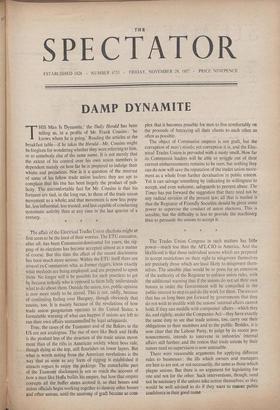DAMP DYNAMITE
' HIS Man Is Dynamite,' the Daily Herald has been T telling us, in a profile of Mr. Frank Cousins : 'he knows where he is going.' Reading the articles at the breakfast table—if he takes the Herald—Mr. Cousins might be forgiven for wondering whether they were referring to him, or to somebody else of the same name. It is not merely that the extent of his control over his own union members is dependent mainly on how far he is prepared to indulge their whims and prejudices. Nor is it a question of the mistrust of some of his fellow trade union leaders; they are apt to complain that his rise has been largely the product of pub- licity. The uncomfortable fact for Mr. Cousins is that his fortunes are tied, in the long run, to those of the trade union movement as a whole; and that movement is now.less popu- lar, less influential, less trusted, and less capable of conducting systematic activity than at any time in the last quarter of a century.
*
The affair of the Electrical Trades Union elections might at first seem to be the least of their worries. The ETU executive, after all, has been Communist-dominated for years; the rig- ging of its elections has become accepted almost as a matter of course. But this time the effect of the recent disclosures has been much more serious. Within the ETU itself there are several ex-Communists who, as former riggers, know exactly what methods are being employed, and are prepared to upset them. No longer will it be possible for such practices to get by because nobody who is opposed to them fully understands what to do about them. Outside the union, too, public opinion is now more ready to be stirred. This is not, oddly, because of continuing feeling over Hungary, though obviously that counts, too. It is mainly because of the revelations of how trade union gangsterism operates in the United States; a formidable warning of what can happen if unions are left to run their own affairs untrammelled by legal safeguards.
True, the cases of the Teamsters and of the Bakers in the US are not analogous. The rise of men like Beck and Hoffa is the product less of the structure of the trade union move- ment than of the rifts in American society where boss rule, though dying at the top, still flourishes on lower layers. But what is worth noting from. the American revelations is the way that as soon as any form of rigging is established it attracts rogues to enjoy the pickings. The remarkable part of the Teamster disclosures is not so much the account of how a man like Hoffa builds his empire, but how that empire corrupts all the buffer states around it, so that bosses and union officials begin working together to destroy other bosses and other unions, until the anatomy of graft became so com- plex that it becomes possible for men to live comfortably on the proceeds of betraying all their clients to each other as often as possible.
The object of Communist empires is not graft, but the corruption of men's minds; yet corruption it is, and the Elec- trical Trades Union is pervaded with a nasty smell., How far its Communist leaders will be able to wriggle out of their current embarrassments remains to be seen; but nothing 'they can do now will save the reputation of the trade's union move- ment as a whole from further devaluation in public esteem. Yet it can salvage 'something by indicating its willingness to accept, and even welcome, safeguards to prevent abuse. The Times has put forward the suggestion that there need not be any radical revision of the present law; all that is needed is that the Registrar of Friendly Societies should be given some power to supervise the conduct of union elections. This is sensible; but the difficulty' is less to provide the machinery than to persuade the unions to accept it.
* * *
The Trades Union Congress in such matters has little power—much less than the AFL-CIO in America. And the likelihood is that those individual unions which are prepared to accept restrictions on their right to misgovern themselves are precisely those which are least likely to misgovern them- selves. The sensible plan would be to press for an extension of the authority of the Registrar to enforce union rules, with the additional warning that if the unions do not set their own houses in order the Government will be compelled in the public interest to step in and do the work for them. The excuse that has so long been put forward by governments that they do not wish to meddle with the unions' internal affairs cannot hold; if they can meddle with companies' affairs—which they do, and rightly, under the Companies Act—they have exactly the same duty to see that trade unions, too, carry out their obligations to their members and to the public. Besides, it is now clear that the Labour Party, to judge by its recent pro- nouncements, intends to intervene in industries' internal affairs still further; and the notion that trade unions by their nature need no supervision is now untenable.
There were reasonable arguments for applying different rules to businesses : the ills which owners and managers are heir to are not, or not necessarily, the same as those which plague unions. But there is no argument for legislating for one and not for the other. Such interventions, though, need not be necessary if the unions take action themselves; as they would be well advised to do if they want to restore public confidence in their good name.














































 Previous page
Previous page